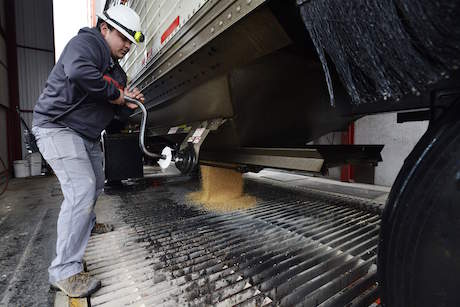forum
library
tutorial
contact

Old PGG Terminals,
Elevators to Get Upgrades
by George PlavenCapital Press, March 14, 2018
|
the film forum library tutorial contact |

|
Old PGG Terminals,
by George Plaven |
United Grain Corporation has started making upgrades
at old PGG facilities, including the McNary Terminal.
 When United Grain Corporation stepped in for Pendleton Grain Growers last year, purchasing all of the co-op's old grain infrastructure, the company promised to invest $9 million toward making the facilities more modern and efficient.
When United Grain Corporation stepped in for Pendleton Grain Growers last year, purchasing all of the co-op's old grain infrastructure, the company promised to invest $9 million toward making the facilities more modern and efficient.
Those upgrades are now underway. Among other things, United Grain plans to add two new ground piles near Mission and Helix, and has already installed automated kiosks at the McNary river terminal to help trucks weigh and unload cargo faster.
Jason Middleton, region manager for United Grain, said they are also working to buy 20 more acres from the Port of Umatilla to expand at McNary along the Columbia River, boosting storage capacity by 3-4 million bushels. As for upcountry elevators, Middleton said they will provide space for specialty crops other than wheat, such as beans, canola and barley.
The projects were laid out during a series of grower's meetings last week in Pendleton, Hermiston and La Grande, giving local farmers an idea of what to expect come next harvest.
"Speed, space and service is what our goals are here," Middleton said. "We're trying to repair our infrastructure, and keep up with the grower."
For 86 years, members relied on PGG for fuel, agronomy, marketing and more. After PGG dissolved on May 2, 2016, the Board of Directors voted to sell its grain assets to United Grain, including the McNary terminal, Alicel rail terminal and upcountry elevators.
United Grain took over the business on June 10, just weeks before wheat harvest began. That didn't allow much time to focus on improving buildings, though Middleton, who was hired by PGG as the director of grain operations in 2012, said they knew coming in there was work that needed to be done.
"There was just a lack of maintenance on a lot of those projects," said Middleton, who used to work as PGG's director of grain operations. "You can go back four decades, at least."
With that hectic first harvest behind them, Middleton said they are now ready to move forward on infrastructure. The bulk of the money will be spent at McNary, he said, where they recently automated kiosks at the trucking scales. Now, drivers simply swipe a card to bring up their information, and are directed to one of five pits where they can unload grain.
The way scales are set up will allow trucks to flow in one direction, Middleton said, instead of before when drivers had to weigh in and out at the same scale.
"It's going to save a lot of time, compared to last year," he said. "There's no reason trucks couldn't get in and out anywhere from five to eight minutes, entire process."
Automation has also come to the elevator control room at McNary, which will make it easier for the operators there to switch between bins and keep wheat segregated. The idea, Middleton said, is to maximize efficiency -- the less time farmers spend at the elevator, the more time they have to work in the fields.
That's also the concept behind ground piles at Mission and Helix. As combines are able to cut wheat faster, Middleton said farmers are using larger trucks to deliver grain, which can be unloaded more quickly at piles as opposed to the old upcountry elevators.
Each pile will store 1.4 million bushes, Middleton said. The goal is to build a third pile near Athena by next year as well, he added.
Finally, a ground pile and automated scales will be installed at the Alicel Terminal near La Grande. Both Alicel and McNary are used for storing and shipping grain, which is hauled by train at Alicel and by river barge at McNary.
"It should just be a lot more of an efficient process," he said.
As for the upcountry elevators, many of the old wooden buildings have already been closed for safety, Middleton said. Those include Helix, Rew, Mission, Stanton, Elgin, and Holdman.
But some of the metal and concrete elevators will be upgraded, where farmers will be able store crops on demand separate from traditional wheat. With wheat prices as low as they are, Middleton said he expects farmers may be considering alternatives to help pay the bills.
Options are limited in dryland farming, but barley, canola and certain types of beans or peas may be options, depending on the market.
"If there are other options out there, I think guys will be looking at them," he said.
Some of the "on demand" crop elevators will include Fulton, Sparks, Pilot Rock, Juniper, Adams and Midway. Many of these facilities simply need some routine repairs and maintenance, Middleton said, but won't require a ton of capital.
By giving farmers more tools come harvest, Middleton said United Grain hopes to become a competitive choice for growers in the region.
"It's difficult being a farmer now, with margins as tight as they are," Middleton said. "We want to be their best option."
learn more on topics covered in the film
see the video
read the script
learn the songs
discussion forum
